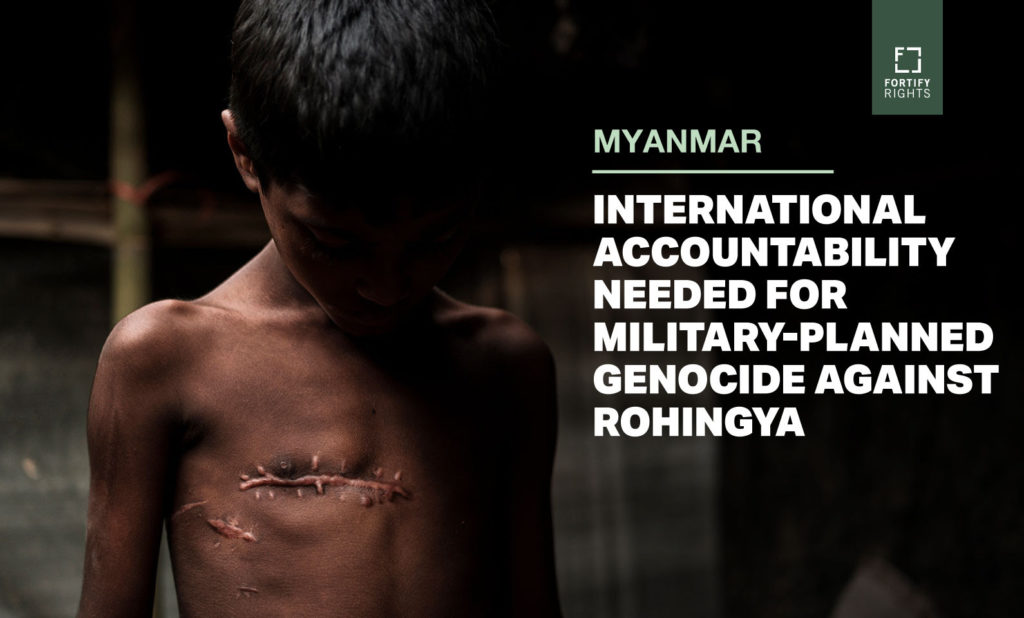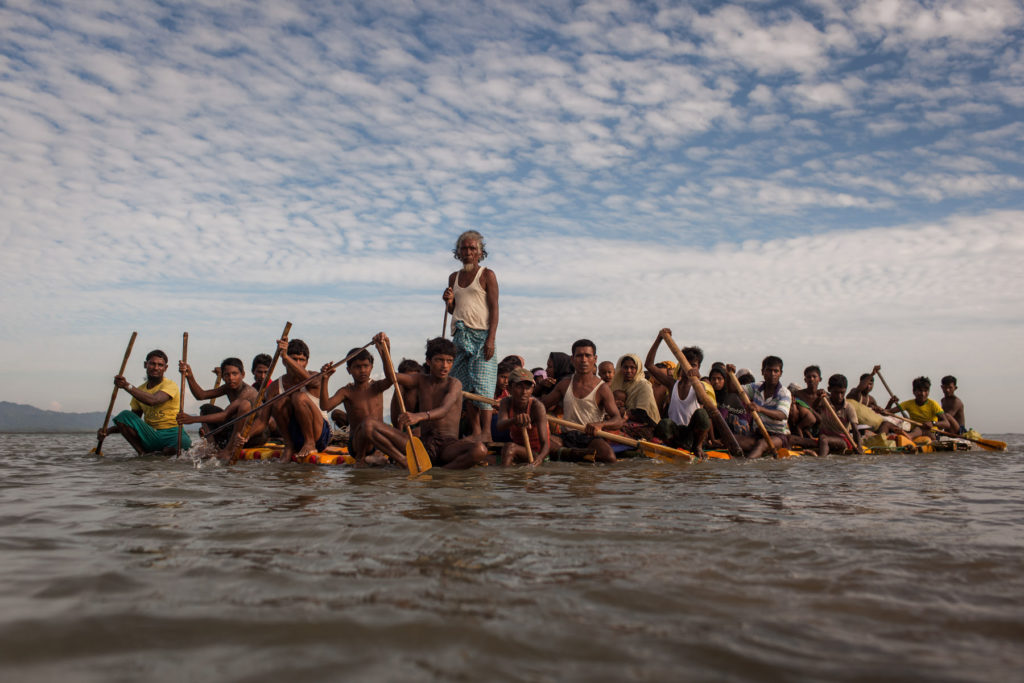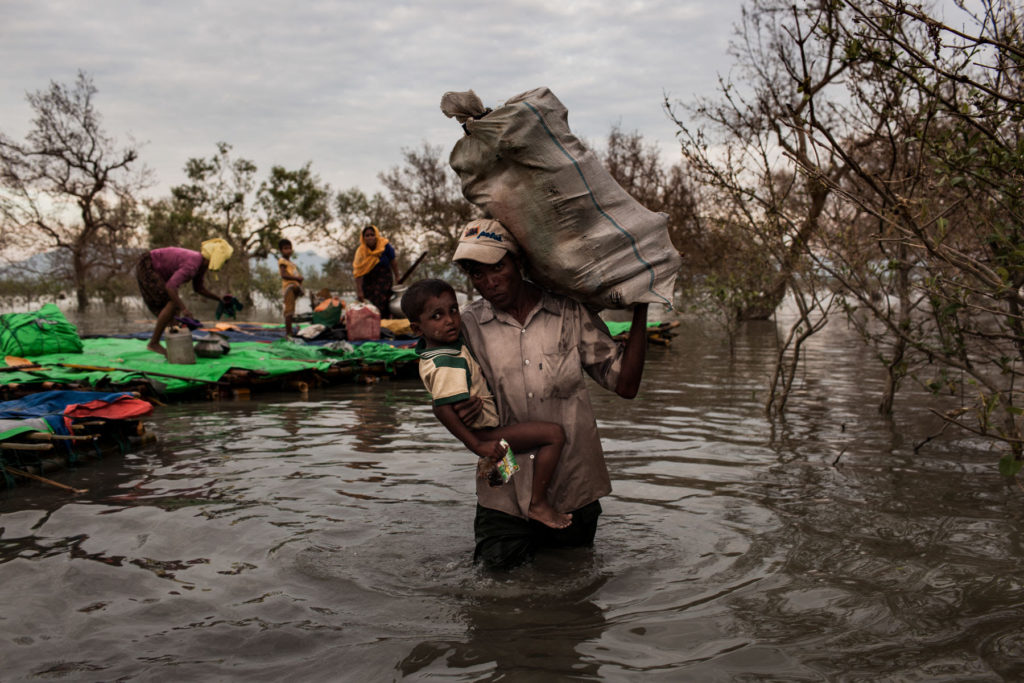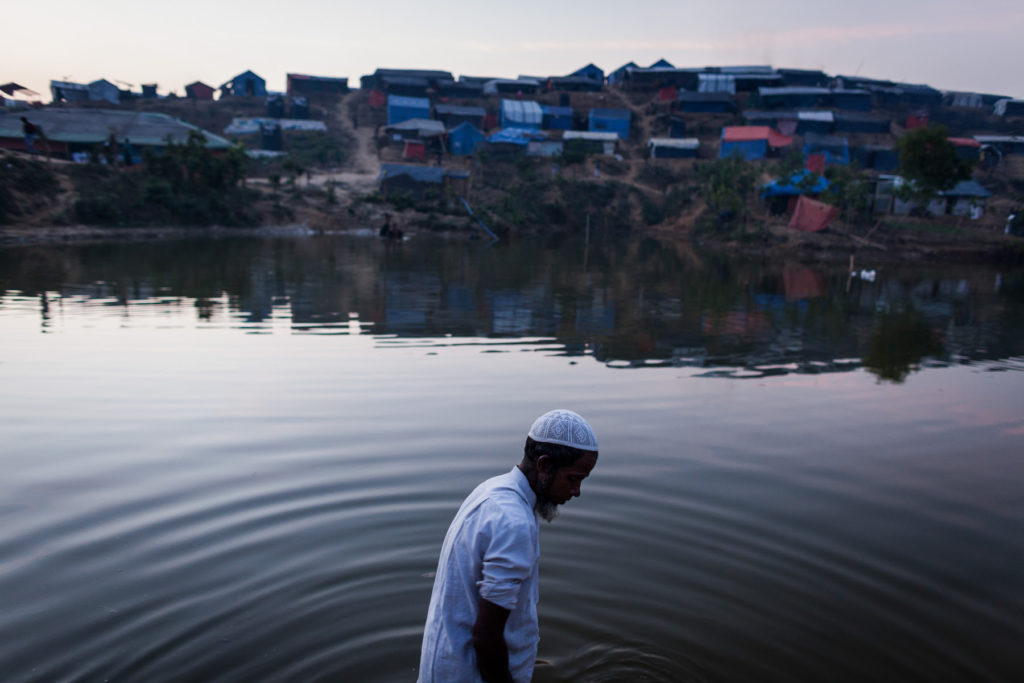Myanmar: International Accountability Needed for Military-Planned Genocide against Rohingya–Report
ASIA-UPDATES ON MYANMAR ROHINGYA GENOCIDE, 23 Jul 2018
Fortify Rights – TRANSCEND Media Service
Report finds “reasonable grounds” for ICC arrest warrants, identifies 22 military and police officials.

19 Jul 2018 – The Myanmar authorities made “extensive and systematic preparations” for attacks against Rohingya civilians during the weeks and months before militants attacked police on August 25, 2017, Fortify Rights said in a new report released today. The report finds “reasonable grounds” that crimes against Rohingya constitute genocide and crimes against humanity, and it identifies 22 Myanmar Army and Police officials who should be criminally investigated for their roles in atrocities.
In order for the International Criminal Court (ICC) to issue an arrest warrant, the prosecutor must find “reasonable grounds” that perpetrators committed genocide and/or crimes against humanity. The report calls on the United Nations Security Council to urgently refer the situation in Myanmar to the ICC. |
|
“Genocide doesn’t happen spontaneously,” said Matthew Smith, Chief Executive Officer at Fortify Rights. “Impunity for these crimes will pave the path for more violations and attacks in the future. The world can’t sit idly by and watch another genocide unfold, but right now, that’s exactly what’s happening.”
The dominant narrative about what occurred in Myanmar’s northern Rakhine State in 2017 suggests that Rohingya militants attacked dozens of police outposts, instigating a spontaneous Myanmar Army-led crackdown against Rohingya civilians, forcing the displacement of hundreds of thousands to Bangladesh.
The 160-page report, “They Gave Them Long Swords”: Preparations for Genocide and Crimes Against Humanity Against Rohingya Muslims in Rakhine State, Myanmar, documents how the Myanmar authorities committed mass killings, rape, and arson attacks against Rohingya in Maungdaw Township in October and November 2016. When the international community failed to effectively respond to these attacks, Myanmar authorities made preparations to commit another attack that extended throughout all three townships of northern Rakhine State—Maungdaw, Buthidaung, and Rathedaung.
 Stranded on the Myanmar border with limited or no food and water for up to 20 days after fleeing Myanmar Army-led attacks, Rohingya refugees finally cross the Naf River on a makeshift raft made of bamboo and empty palm-oil cans—a five to seven-hour-long journey.
Patrick Brown © Panos/UNICEF 2018 |
|
| Specifically, Myanmar authorities: 1) systematically collected sharp or blunt objects from Rohingya civilians, “disarming” them; 2) trained and armed local non-Rohingya ethnic citizens in northern Rakhine State, preparing them for violence; 3) systematically tore down fencing and other structures around Rohingya homes, providing attackers with a greater line-of-sight on civilians; 4) deprived Rohingya civilians of food and other lifesaving aid, systematically weakening them physically ahead of attacks; 5) deployed unnecessarily high numbers of state-security forces to northern Rakhine State; and 6) committed human rights violations against Rohingya civilians, including imposing discriminatory curfews and other violations prior to attacks.
These deliberate actions fit within the United Nations’ Framework for Analysis of Atrocity Crimes as “preparatory actions” for genocide and crimes against humanity.
The report finds at least 27 Myanmar Army battalions, comprising up to 11,000 soldiers, along with at least three combat police battalions, comprising an estimated 900 police personnel, were involved in the attacks in northern Rakhine State beginning in August 2017.
Fortify Rights identifies 22 military and police officials with command responsibility for the “clearance operations” in northern Rakhine State. These officials should be criminally investigated and potentially prosecuted for genocide and crimes against humanity. The list includes Commander-in-Chief Senior General Min Aung Hlaing, Deputy Commander-in-Chief Vice Senior General Soe Win, and the Joint Chief of Staff of the Army, Navy, and Air Force General Mya Tun Oo.
 Stranded on the Myanmar border for up to three weeks, Rohingya refugees cross the Naf River into Bangladesh—a five to seven-hour-long journey—on makeshift rafts made of bamboo, tarp, and empty palm-oil cans. Patrick Brown © Panos/UNICEF 2018 |
|
The report is based on a 21-month-long investigation, including 254 interviews conducted by Fortify Rights in Myanmar and Bangladesh with Rohingya eyewitnesses and survivors, Myanmar military and police personnel, Bangladesh military and government officials, members and former members of the Arakan Rohingya Salvation Army (ARSA)—also known as al Yaqin, a militant Rohingya group—international and local humanitarian aid workers, medical physicians, and others.
“They came and took all the knives away,” said “Rahana,” a 50-year-old Rohingya mother of two from Nyaung Chaung village in Buthidaung Township. “It was around two weeks ago,” she told Fortify Rights on August 30, 2017.
Myanmar authorities provided weapons—firearms and swords—and quasi-military training to non-Rohingya citizens in northern Rakhine State months and, in some cases, immediately prior to attacks on Rohingya that began on August 25, 2017.
“They gave them long swords,” said “Mohammed Rafiq,” a 25-year-old Rohingya eyewitness to a Myanmar Army-led massacre in Tula Toli—also known as Min Gyi—in Maungdaw Township on August 30, 2017. “I could see it. [The soldiers] handed [Rakhine civilians] swords. Even young Rakhine boys were given long swords, and they were moving around with the swords hanging on their backs.”
 A Rohingya refugee uses one of the many man-made dams in Balokhali 2 refugee camp, Cox’s Bazar District, Bangladesh. Patrick Brown © Panos/UNICEF 2018 |
|
| While disarming Rohingya and arming non-Rohingya in northern Rakhine State, the Myanmar authorities blocked humanitarian aid to Rohingya, including food and lifesaving aid. This had the effect of systematically weakening Rohingya civilians ahead of attacks against them.
The government also restricted access for journalists and human rights monitors before the attacks, including the Independent International Fact-Finding Mission, established in March 2017 by the United Nations Human Rights Council.
Fortify Rights interviewed several current and former members of ARSA who explained their involvement in hastily planned attacks on police outposts on August 25, which provided the ostensible spark for the Myanmar Army-led crackdown on civilians. Those interviewed by Fortify Rights described ARSA as having little to no military capacity and no training.
Upon ARSA’s assault on police outposts on August 25, Myanmar authorities activated local non-Rohingya citizens, some of whom they previously armed and trained. Together, they attacked Rohingya villages.
Fortify Rights documented how soldiers, police, and local non-Rohingya citizens hacked civilians, slit throats, and fatally shot and burned thousands of Rohingya men, women, and children in a matter of weeks. Soldiers raped masses of Rohingya women and girls, killed infant children, arbitrarily arrested men and boys, and destroyed several hundred villages in arson attacks, forcing more than 700,000 to flee to Bangladesh. |
|
This article originally appeared on Transcend Media Service (TMS) on 23 Jul 2018.
Anticopyright: Editorials and articles originated on TMS may be freely reprinted, disseminated, translated and used as background material, provided an acknowledgement and link to the source, TMS: Myanmar: International Accountability Needed for Military-Planned Genocide against Rohingya–Report, is included. Thank you.
If you enjoyed this article, please donate to TMS to join the growing list of TMS Supporters.
Share this article:
email
mastodon
facebook
🔗 copy link

This work is licensed under a CC BY-NC 4.0 License.





[…] (Time)- In the weeks and months before hundreds of thousands of Rohingya civilians fled from Myanmar to Bangladesh, authorities had made “extensive and systematic preparations” for attacks on the Muslim minority, according to a human rights group. […]